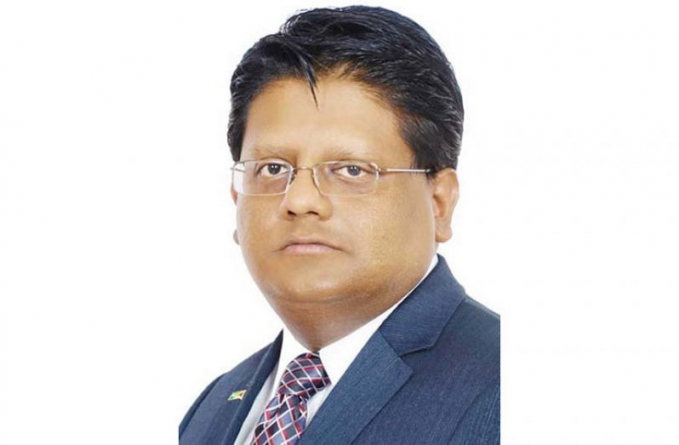Bureaucracy, bottlenecks to doing business will be reduced – Dr. Singh
GUYANA’S new status as an oil producer and oil exporter has generated unprecedented interest by companies across the world, but turning that interest into tangible investments hinges on the reduction in, or simplification of, laborious processes and ‘red tape’ which, in most cases, would discourage investors.
The World Bank’s Ease of Doing-Business 2020 report showed that Guyana slipped two spaces in its rankings for 2019, relative to 2014. Among the problems identified in the report were the processing of construction permits, registration of property and the payment of taxes.
With renewed and increased interest in the local economy, Guyana has an opportunity to assess its systems and create processes which are business-friendly and encouraging for not just international investors, but locals as well.
The new government has already committed to building a ‘modern’ Guyana with world-class infrastructure that improves connectivity and unlocks the vast potential of the economy.
Senior Minister with responsibility for Finance, Dr. Ashni Singh, has said that the current hurdle to Guyana’s economic boom is the novel coronavirus (COVID-19) pandemic, which has presented direct and indirect challenges to economies around the world.
“Government has since taken rapid steps to protect the people and deliver much-needed assistance, while ensuring that the economy neither grinds to a halt nor suffers irreversible damages,” said Dr. Singh, in his address, during the American Chamber of Commerce’s (AMCHAM’s) virtual Annual General Meeting (AGM), on Friday.
Looking beyond the immediate challenges, created by the pandemic, the Finance Minister said the prospects remain “historically bright” and the long-awaited transformation is on the verge of unfolding.
“Becoming an oil producer presents us with an opportunity and the means to improve the well-being of the Guyanese people and realise the long-standing aspirations of the country,” said Dr. Singh.
The new government has already committed to creating an enabling environment for business development through a seven-point plan which includes preserving the rule of law and democracy; improving the ease of doing business; enhancing national competitiveness; facilitating trade and investment; and supporting small businesses.
Dr. Singh reiterated this plan, noting that, in addition to creating the required infrastructure for business development, the government is working to ensure that there is a highly skilled workforce and state institutions which encourage and facilitate, rather than hinder and frustrate the operations or potential operations of investors.
“Reducing bureaucracy and removing bottlenecks to doing business is an important pillar of institutional development,” said the Senior Minister.
According to a study done by the Government of Germany and other stakeholders, a perfectly sensible bureaucratic procedure can become clumsy through poor interfaces between people, or through poor communication on how the process works.
The study found that streamlining procedures and increasing the service orientation of administrative personnel can, therefore, play an important role in reducing inefficiency and thus reducing costs.
Red tape shows up in and between all kinds of organisations, such as the different spheres of the government, in the private sector and in civil society.
An example of this, in Guyana’s perspective, is the difficulty faced by local businesses when trying to access contracts, particularly in the oil and gas sector.
President of AMCHAM Guyana, Zulfikar Ally, has said that the need for international best practices, compliances and certification cannot be overstated, but they provide a disadvantage to businesses participating in contracts, especially in the oil and gas sectors.
And, it also creates a great deal of frustration for investors who are bound by policies and international best practices to ensure that they only hire firms that are in compliance with those requirements.
It is for this reason that AMCHAM Guyana has started to put plans in place to work with partners to bridge the gap between its American members and those that are Guyanese-owned. The organisation has 92 members.
“AMCHAM [and other stakeholders] have been leading in training, facilitating and encouraging companies to get relevant certification,” said Ally.
The organisation has recently re-launched its website to provide real-time updates and information for members and non-members.
The advancement of local businesses is especially important at this time because Guyana and the U.S. will soon commence the first working group to implement the initiatives outlined in a Memorandum of Understanding (MoU), signed recently by President Irfaan Ali and the U.S. Secretary of State, Mike Pompeo.
The MoU aims to provide a platform for U.S. private sector investment to build Guyana’s physical infrastructure, energy sector, and digital economy transparently. Guyana is the second Caribbean country to sign the MoU, joining Jamaica.
The framework agreement to strengthen cooperation between the two countries in the Growth in the Americas Initiative is expected to help them to identify specific ways to advance their joint interest.
This agreement, President Ali had said, will boost the business environment for U.S. private sector investment in Guyana, particularly in the fields of energy, both non-renewables and renewables, along with infrastructure.
Further, he said the agreement will also pave the way for the U.S. private sector to expand its investment portfolio and partner with Guyana’s private sector.
U.S. Ambassador to Guyana, Sarah-Ann Lynch, during her remarks at AMCHAM’s AGM, said the commercial interest in Guyana is increasing exponentially.
Investors, she said, are interested in investing in oil and gas; environmental resilience; housing and a few other sectors.






















